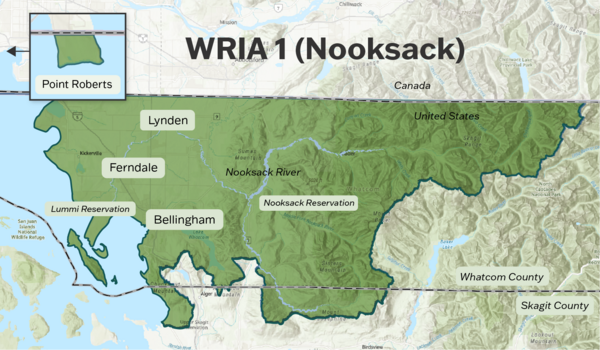The Washington Department of Ecology filed a basin-wide general adjudication for the Nooksack river system and nearby areas with the Whatcom County Superior Court on May 1, formally beginning the adjudication process.
A water rights adjudication determines whether each water use on a source is legal, how much water can be used, and its priority during shortages.
The adjudication will include all of the water rights in the Nooksack River system and nearby areas, also known as Water Resource Inventory Area 1 (WRIA 1). This includes groundwater rights and permit-exempt wells in the area.
“Even though Ecology, Tribes, and local leaders have worked on water issues for over 30 years, we realize that adjudication may be a new topic to many people in the area,” said Robin McPherson, Ecology’s adjudication manager. “This legal process is a necessary step to resolve water management issues so that we can plan for future water supply needs of this growing region. Ecology is committed to providing a variety of ways to help people understand and participate in the process.”
No action is required at this time. In the coming months, water users will receive a summons by certified mail with instructions for filing their claims. Water users will be directed to file with the court within one year. Those who do not file their claims with the court risk losing their ability to legally use water.
“At its heart, adjudication is simply a legal requirement to provide information,” McPherson said. “Adjudication will produce a court-determined inventory that spells out who has the right to use water, how much they can legally use, and what the order of priority is for those rights. This inventory is fundamental to developing long-term, fair solutions for sharing this common resource.”
The adjudication is expected to include as many as 30,000 water users in and around Whatcom County including local governments, Lummi Nation, and Nooksack Tribe. Those who only use water from a utility, a category that includes most residents of Bellingham and other cities in the area, will not be affected by the adjudication.
Ecology has a number of resources to help water users understand and participate in the adjudication process:
In-person assistance will be available later this year. Ecology has also provided a grant to Whatcom County Public Works to help local users with the upcoming claim filing process.
Copies of the legal filing are available online and at the following locations:
- Department of Ecology, Bellingham Field Office (by appointment only)
913 Squalicum Parkway #101, Bellingham
- Whatcom County Library System – Lynden Library
216 4th St, Lynden
- Whatcom County Library System – Ferndale Library
2125 Main St, Ferndale
What is adjudication?
Adjudication is a common tool used by western states to resolve conflict and competition on a water source. In Washington, adjudication has been used since the early 1900s.
In 2019, the Washington Legislature directed the Department of Ecology to assess areas of the state for adjudication. Ecology identified an urgent need in WRIA 1 to provide water users clarity and certainty of water rights.
A watershed-wide adjudication prioritizes each individual water right, including federal, tribal and instream flow rights, under Washington water law’s “first-in-time, first-in-right” prior appropriation framework.
Adjudication is important to ensure water regulation is fair and everyone follows the same rules. In the Nooksack, there are longstanding uncertainties surrounding legal water use. Many records do not reflect legal or actual use. Federal and tribal water rights are not quantified. Attempts to resolve water disputes collaboratively, over many years, have not led to a solution.
Until water uses are adjudicated, uncertainty about the future of our water supply will continue to grow. Instead of addressing individual challenges to water use, an adjudication results in a comprehensive decree and final determination. As climate change continues to impact our water supply, developing an assessment of legal water rights will help with long-term planning.

